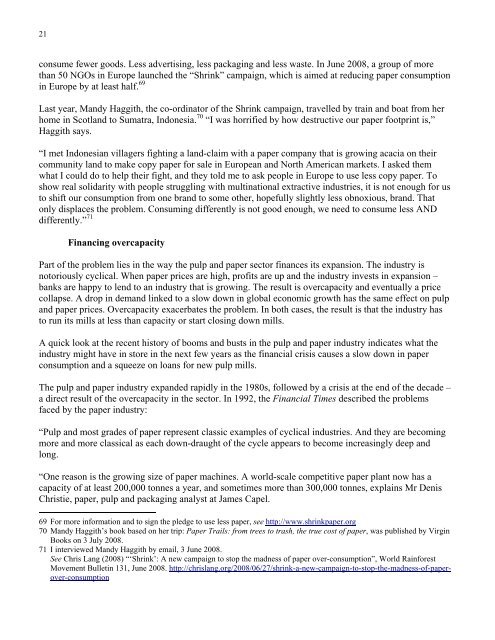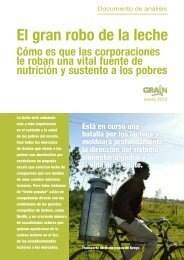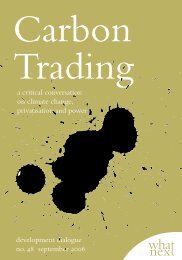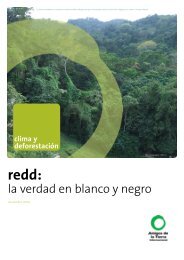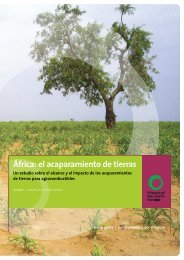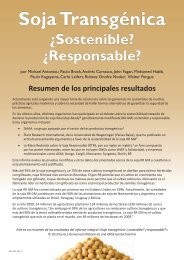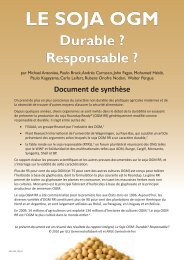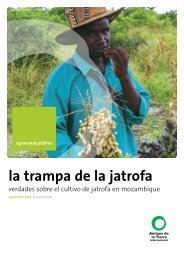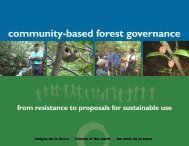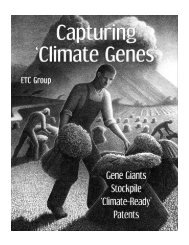Plantations, poverty and power - Critical Information Collective
Plantations, poverty and power - Critical Information Collective
Plantations, poverty and power - Critical Information Collective
You also want an ePaper? Increase the reach of your titles
YUMPU automatically turns print PDFs into web optimized ePapers that Google loves.
21<br />
consume fewer goods. Less advertising, less packaging <strong>and</strong> less waste. In June 2008, a group of more<br />
than 50 NGOs in Europe launched the “Shrink” campaign, which is aimed at reducing paper consumption<br />
in Europe by at least half. 69<br />
Last year, M<strong>and</strong>y Haggith, the co-ordinator of the Shrink campaign, travelled by train <strong>and</strong> boat from her<br />
home in Scotl<strong>and</strong> to Sumatra, Indonesia. 70 “I was horrified by how destructive our paper footprint is,”<br />
Haggith says.<br />
“I met Indonesian villagers fighting a l<strong>and</strong>-claim with a paper company that is growing acacia on their<br />
community l<strong>and</strong> to make copy paper for sale in European <strong>and</strong> North American markets. I asked them<br />
what I could do to help their fight, <strong>and</strong> they told me to ask people in Europe to use less copy paper. To<br />
show real solidarity with people struggling with multinational extractive industries, it is not enough for us<br />
to shift our consumption from one br<strong>and</strong> to some other, hopefully slightly less obnoxious, br<strong>and</strong>. That<br />
only displaces the problem. Consuming differently is not good enough, we need to consume less AND<br />
differently.” 71<br />
Financing overcapacity<br />
Part of the problem lies in the way the pulp <strong>and</strong> paper sector finances its expansion. The industry is<br />
notoriously cyclical. When paper prices are high, profits are up <strong>and</strong> the industry invests in expansion –<br />
banks are happy to lend to an industry that is growing. The result is overcapacity <strong>and</strong> eventually a price<br />
collapse. A drop in dem<strong>and</strong> linked to a slow down in global economic growth has the same effect on pulp<br />
<strong>and</strong> paper prices. Overcapacity exacerbates the problem. In both cases, the result is that the industry has<br />
to run its mills at less than capacity or start closing down mills.<br />
A quick look at the recent history of booms <strong>and</strong> busts in the pulp <strong>and</strong> paper industry indicates what the<br />
industry might have in store in the next few years as the financial crisis causes a slow down in paper<br />
consumption <strong>and</strong> a squeeze on loans for new pulp mills.<br />
The pulp <strong>and</strong> paper industry exp<strong>and</strong>ed rapidly in the 1980s, followed by a crisis at the end of the decade –<br />
a direct result of the overcapacity in the sector. In 1992, the Financial Times described the problems<br />
faced by the paper industry:<br />
“Pulp <strong>and</strong> most grades of paper represent classic examples of cyclical industries. And they are becoming<br />
more <strong>and</strong> more classical as each down-draught of the cycle appears to become increasingly deep <strong>and</strong><br />
long.<br />
“One reason is the growing size of paper machines. A world-scale competitive paper plant now has a<br />
capacity of at least 200,000 tonnes a year, <strong>and</strong> sometimes more than 300,000 tonnes, explains Mr Denis<br />
Christie, paper, pulp <strong>and</strong> packaging analyst at James Capel.<br />
69 For more information <strong>and</strong> to sign the pledge to use less paper, see http://www.shrinkpaper.org<br />
70 M<strong>and</strong>y Haggith’s book based on her trip: Paper Trails: from trees to trash, the true cost of paper, was published by Virgin<br />
Books on 3 July 2008.<br />
71 I interviewed M<strong>and</strong>y Haggith by email, 3 June 2008.<br />
See Chris Lang (2008) “‘Shrink’: A new campaign to stop the madness of paper over-consumption”, World Rainforest<br />
Movement Bulletin 131, June 2008. http://chrislang.org/2008/06/27/shrink-a-new-campaign-to-stop-the-madness-of-paperover-consumption


